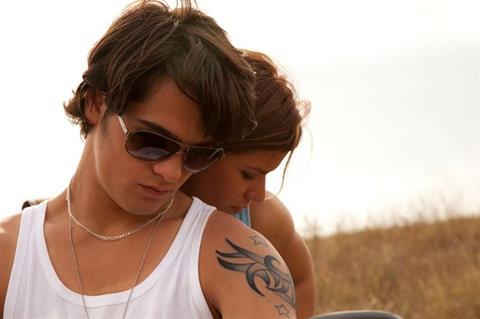Dir: Catalin Mitulescu. Romania/Sweden/Serbia. 2011. 94mins

Catalin Mitulescu’s Loverboy is the story of doomed self-destructive love unfolding against the background of an unflattering slice of Romanian life, and coming five years after his first film, How I Spent The End Of The World, which dealt with the end of the Ceausescu era in Romania.
Visuals, such as the bleak landscape and ramshackle lodgings, suggest the kind of place no one would willingly choose to live in.
Working with the two talented young leads of last year’s Berlin-awarded If I Want To Whistle, I Whistle, George Pistereanu and Ana Condeescu, and with most of the crew that assisted him in his debut film and dwells mainly on the impossible romance between the two adolescents. Mitulescu doesn’t quite manage to balance between the moving personal story and the conditions that ultimately kill it, the unfocused background generating the feeling of a work that still needs to be completed.
The victims of an economic system where money is scarce but temptations to spend it lurk around every corner, Luca (Pistereanu) and his friends, all of them small time hoods with nothing to do, are providing girls for pimps who sell them abroad for prostitution.
For the youngsters, it’s an easy way to make money - flirting, taking their preys on rides in cars they do not own for long nights of drinking and sex on the beach (the entire picture takes place in the vicinity of Constanta, Romania’s main harbor on the Black Sea), before delivering “the merchandise” and ultimately getting paid for having a ball.
Bad conscience is never an issue with these “loverboys”, for after a certain point the girls they pick up almost volunteer, in their own peculiar way, to become hookers, and if any of them has second thoughts about it at a later date, she risks finding herself on the morgue table.
Half an hour into the film, Luca is courting Veli (Condeescu) who turns out to be less of a sucker than the rest of her girlfriends. She insists on her own terms, and when she finally gives in to Luca’s entreaties, it is because she actually falls for him, lock, stock and barrel.
As for Luca, while still pretending to be a tough guy who rejects any notion of an emotional attachment, he suddenly finds himself strangely affected by this strange girl, who almost threatens to change his life around and turn him into a regular guy. Now his friends look down on him, his former employers are demanding their loans paid back or else and Luca is worried enough to send Veli back home to her parents.
But she insists she loves him enough to stick with him through hell and high water, even if she has to prostitute herself for his sake, without realising that such a test may be too tough for real love to survive.
Luca, whose mother has an unspecified job in Rome and is singlehandedly taking care of his incapacitated grandfather, immediately strikes a sympathetic chord with the audience - despite all his braggadocio his sincere affection for the rebellious Veli is more than any of his friends would be capable of.
Their relationship is by far the best part of the picture, the ties between them captured in the glances they exchange or small, insignificant gestures revealing the feelings hiding under the pretense of a hard-boiled surface. Visuals, such as the bleak landscape and ramshackle lodgings, suggest the kind of place no one would willingly choose to live in, but much of the backdrop which should have given the conflict its real weight, is not sufficiently distinct and precise.
Production companies: Strada Film
International Sales: Celluloid Dreams, www.celluloid-dreams.com
Producers: Daniel Mitulescu, Catalin Mitulescu, Marcian Lazar
Executive producer: Florentina Onea
Screenplay: Catalin Mitulescu, Bianca Oana, Bogdan Mustata
Cinematography: Marius Panduru
Editor: Cristina Ionescu, Stefan Ioan Tatu
Production designer: Daniel Raduta
Cast: George Pistereanu, Ana Condeescu, Ion Besoiu, Clara Voda, Bogdan Dumitrache, Coca Bloos, Remus Marginian, Alexandru Mititelu, Adina Galupa






















